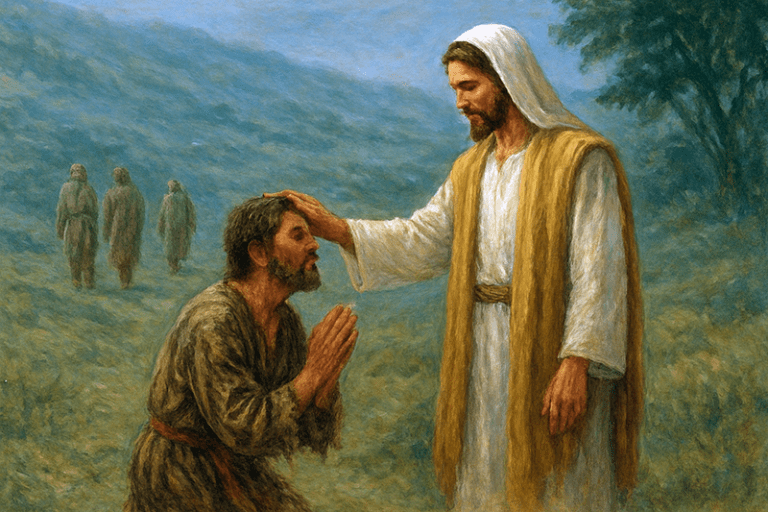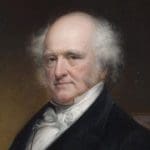“Ten lepers hollered to the Savior, ‘Have mercy on us.’” Sister Camille N. Johnson began her address in the most recent general conference, “And Jesus did.”
But Sister Johnson pointed out a distinction that we may not often think about, as she shared more of this incident from the New Testament account known by Christians across the world:
And one of them, when he saw that he was healed, shouted praises to God. He returned to the Savior, fell at His feet, and expressed gratitude.
And the Savior said to him who was thankful, “Thy faith hath made thee whole.”
Jesus Christ had healed ten lepers. But one, coming back to the Savior, received something in addition. He was made whole.
Nine lepers were physically healed.
One was physically healed and made spiritually whole.
In pondering this story, I have wondered if the converse is true. If healing and wholeness are not the same, can one be made spiritually whole by Him but not yet physically and emotionally healed?
We often think this is a story about the importance of gratitude, but this former leper’s gratitude came of faith, which faith made him whole. Surely spiritual wholeness is something we all crave, but what does it actually look like it a real person’s life?
How was this man’s life different from his former fellows’ moving forward, who had received only physical healing?
Sister Johnson explains:
We are whole in Jesus Christ when we exercise our agency to follow Him in faith, submit our hearts to Him so He can change them, keep His commandments, and enter a covenant relationship with Him, meekly enduring and learning from the challenges of this earthly estate until we return to His presence and are healed in every way.
I can be whole while I wait for healing if I am wholehearted in my relationship with Him.
I especially love the idea that we can be whole if we are wholehearted in our devotion to the Savior. But again, what do those other concepts add up to in terms of how they would change your life right now? How would being spiritually whole change your day today? How would it change the next five years? How would it change how you endure the trials that are not cleared from your path despite faithful prayer and supplication?
One moving example of how spiritual wholeness changes how you endure trials is from the life of Lucy Mack Smith, mother of the prophet Joseph Smith. In her own words:
Once we lay all night in the rain, which descended in torrents, and I, being more exposed than the other females, suffered much with the cold, and upon getting up in the morning, I found that a quilted skirt which I had worn the day before was wringing wet, but I could not mend the matter by changing that for another, for the rain was still falling.
I wore it in this situation for three days. In consequence of this, I took a severe cold and was very sick, so that when we arrived at the Mississippi I was unable to sit up at any length and could not walk without assistance. After we crossed this river, we stopped at a poor hut, a most unlovely place, but we could go no farther. Here my daughter Catharine gave birth to a fine son named Alvin.
I was no longer able to ride in a sitting posture, but lay on a bedstead carefully covered, as the fresh air kept me coughing continually. My husband did not much expect me to live to the end of the journey, for I could not travel sometimes more than four miles a day. But as soon as we arrived at Huntsville, he sought a place where we might stop for some time, so that all that nursing could do for me could be done.
Going as far as Huntsville was my own request, but they did not know why I urged the matter. The fact was, I had an impression that if I could get there and be able to find a place where I could be secluded and uninterrupted in calling upon the Lord, I might be healed.
Accordingly, I seized upon a time when they were engaged, and by the aid of staffs I reached a fence, and then followed the fence some distance till I came to a dense hazel thicket. Here I threw myself on the ground and thought it was no matter how far I was from the house, for if the Lord would not hear me and I must die, I might as well die here as anywhere. When I was a little rested, I commenced calling upon the Lord to beseech his mercy, praying for my health and the life of my daughter Catharine. I urged every claim which the scriptures give us and was as humble as I knew how to be, and I continued praying near three hours. At last I was entirely relieved from pain, my cough left me, and I was well. Moreover, I received an assurance that I should hear from my sick daughter about the middle of the same day. I arose and went to the house in as good health as I ever enjoyed.
Though she experienced physical healing as a result of this incident, the way she approached the situation and trusted the Lord demonstrates to me that she also had the faith not to be healed, if that were His will. She even said that if she must die, it might as well be here (in earnest prayer and devotion) as anywhere.
There are four other details about this incident that bring into vivid color the life of a spiritually whole person.
- “The fact was, I had an impression…”: Lucy was practiced at listening for and then obediently following impressions from the Spirit. Someone who is deathly ill does not follow a thought into potentially fatal danger unless she is quite confident and practiced at listening to the One giving voice to that thought.
- “I urged every claim which the scriptures give us…” To know what the scriptures promise, she must have read them diligently and often. The scriptures are the source of our knowledge about the nature of our divine relationship as a covenant people. That covenant requires certain things of us, but also promises us much. It is not greedy to attentively study what the Lord has promised you and how those promises might be brought to bear in times that feel unbearable.
- “…was as humble as I knew how to be.” No matter how well you know what your covenants promise, the Lord won’t always keep them in the ways or time you expect. But He will keep them. In the meantime, we have to be willing to be humbled again and again and strive to incorporate that into who we are and not feel cut down each time. As I mentioned, she had to have the faith not to be healed.
- “I continued praying near three hours.” I believe a prayer like that comes from familiarity and belief, not just desperation. How many of us regularly cross the 10-minute mark in our prayers let alone three hours? Yet a prayer like that can only come from a continuing (and well-fed) faith that someone really is listening on the other side. As Jesus said, before He had fully begun to bring Lazarus back from the dead, “Father, I thank thee that thou hast heard me. And I knew that thou hearest me always…” (John 11:41-42). You would have to believe you were being heard to continue to speak so long.
This small account from Lucy’s life is an example of when spiritual wholeness can bring about physical healing, but what of those that will not be physically healed in this life, no matter their spiritual commitment?
Sister Johnson gives this compelling example:
The Apostle Paul had some kind of affliction—what he described as a “thorn in the flesh,” which three times he had asked the Lord to remove. And the Lord said to Paul, “My grace is sufficient for thee: for my strength is made perfect in weakness.” To which Paul declared:
“Most gladly therefore will I … glory in my infirmities, that the power of Christ may rest upon me.
“Therefore I take pleasure in infirmities, … in distresses for Christ’s sake: for when I am weak, then am I strong.”
Maybe some part of us cries out for justice and thinks “he’s an apostle and he asked the Lord again and again, why couldn’t he just have that affliction removed?” (And maybe a quieter part of us fears that if this spiritual giant couldn’t be healed, what hope is there for the rest of us?) But when we learn how to truly, fully depend on the strength of the Savior, we have access to more power, security, boldness and blessings than we would have, even if every earthly ailment was taken away.
Paul standing boldly before King Agrippa, despite being in shackles, is the ultimate picture of the confidence that comes of spiritual wholeness, regardless of our physical circumstances.
Festus, the Roman governor, told King Agrippa that Paul had been accused by the Jews and many were calling for his death, though Festus personally didn’t think he had done anything to warrant that. It was not unlike the circumstances Christ himself faced, standing before a skeptical Pontius Pilate though the crowds called for his crucifixion. The odds seemed heavily stacked against Paul, but with the strength of Christ behind you, the odds are never really stacked against you.
In Acts 26, it tells how Paul stood before Agrippa and told the story of his conversion, how he started out as a strict Pharisee and had even persecuted Christians in ways that led to fatal ends. Then he boldly testified before a foreign king that he’d seen Jesus in a vision and been called upon to become a minister and a witness for Him. He said he had testified only what Moses and the prophets had said would happen; that the Messiah (who was Jesus) would suffer, rise from the dead, and show light unto the people and unto the Gentiles.
Agrippa’s unforgettable conclusion was, “almost thou persuadeth me to be a Christian”.
And there stood Paul, having testified boldly, though in chains, but still possessing of some thorn in the flesh that could not or would not be healed and his response was:
I would to God, that not only thou, but also all that hear me this day, were both almost, and altogether such as I am, except these bonds.
His total conversion to the Savior made him wish everybody could have just what he did. Spiritual wholeness gave him the strength to thrive and move forward with faithful optimism, rather than wait for his desired miracle of healing before he would do anything else.
And Paul is one of so many people in our spiritual heritage within the scriptures who endured difficult circumstances, but looked to God to live.
Hebrews 11 mentions so many of these examples and explains their significance so beautifully.
–By faith Abel offered unto God a more excellent sacrifice than Cain, by which he obtained witness that he was righteous, God testifying of his gifts: and by it he being dead yet speaketh.
–Through faith also Sara herself received strength to conceive seed, and was delivered of a child when she was past age, because she judged him faithful who had promised.
–By faith Moses, when he was come to years, refused to be called the son of Pharaoh’s daughter; Choosing rather to suffer affliction with the people of God, than to enjoy the pleasures of sin for a season; Esteeming the reproach of Christ greater riches than the treasures in Egypt: for he had respect unto the recompence of the reward.
My favorite verse of the chapter sums it up beautifully when it says, “These all died in faith, not having received the promises, but having seen them afar off, and were persuaded of them, and embraced them, and confessed that they were strangers and pilgrims on the earth.”
This life is our wilderness journey. We are strangers here, but we have to be here a while, so it is up to us to learn how to find spiritual wholeness, even when we feel the weight of physical brokenness. If you feel broken in that way, you have thousands of years of good company in having that to work through.
We don’t have to wait for perfect circumstances to increase our spiritual devotion. And we don’t have to be healed to live wholly, or live holy.



















Ann-Marie JensenAugust 30, 2025
Thank you for the additional insights into Sister Johnson’s thought-provoking talk.
KathleenAugust 29, 2025
Great article and summation. I believe Sister Johnson's talk will go down as one of the hallmark talks in the Church.